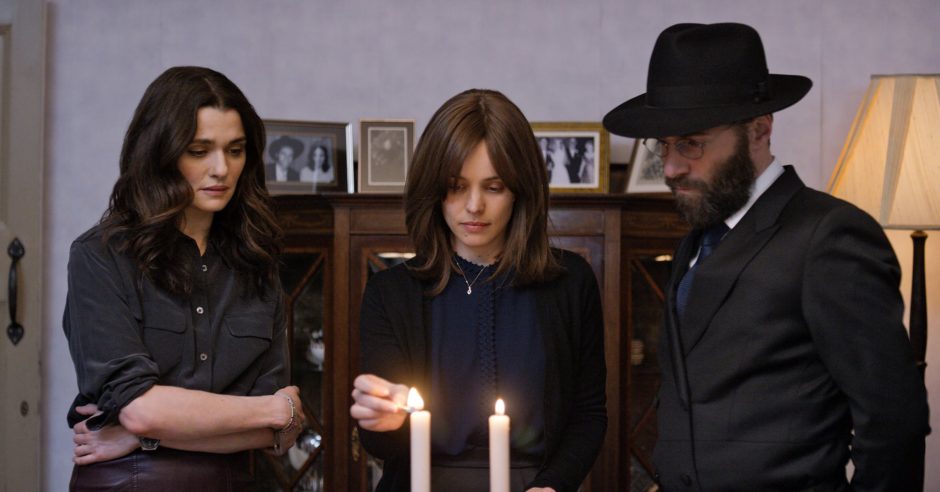Rachel Weisz and Rachel McAdams taste the sweetness of forbidden fruit in Disobedience, a dark yet illuminating film by Sebastian Lelio set in London’s Orthodox Jewish community.

Ronit (Weisz), a professional photographer who lives in New York City, and Esti (McAdams), a teacher at a local Jewish day school, are old friends who haven’t seen each other in years. What brings them together is a funeral. Ronit is single and Etti is newly married to Ronit’s friend, Dovid (Alessandro Nivola), a rabbi.
Known as Ronnie Curtis to her associates, Ronit has been gone for so long that her absence elicits a comment from an acquaintance at a Friday night sabbath meal. “We never thought we’d see you again,” she says.

Ronit left London under a cloud after she and Esti were caught making out, a cardinal sin in a community that utterly rejects lesbianism and homosexuality. In the wake of this incident, Ronit’s father, an eminent rabbi, disowned and excommunicated her. And now, following his sudden death while delivering a fire-and-brimstone sermon in a synagogue, Ronit is in London to pay her respects and attend his funeral. Despite her status as the family’s black sheep, Dovid, her late father’s protege and successor, invites her to stay in his house, a decision that will haunt him.
To Orthodox Jews in Dovid’s circle, Ronit is still a rebel without a cause. When Moshe, her uncle, asks whether she intends to get married, she replies that she has no intention of committing to a “loveless marriage.” It’s not the answer that Moshe expected.

This is not the only surprise in a film infused with the rituals of Judaism. Much to Ronit’s disappointment, she learns that her late father wrote her out of his will, having bequeathed his house to the synagogue. Moshe pours salt on the wound with a comment that she should have attended to his needs in his final days.
Disobedience, which opens in Canada on May 18, cuts to the theme when Esti, in an impulsive or calculated moment, kisses Ronit. Marriage was supposed to “cure” Esti of her errant behavior, but it’s clear she still has a crush on Ronit. Ashamed of her carnal desires, Esti draws back and apologizes, yet she wants Ronit to stay in London.
After another furtive encounter, they repair to a hotel to consummate their romance. When Dovid questions Esti about her absences, she blurts out her secret. “What’s wrong with you? he asks sharply. Esti, disagreeing with his assumption that Ronit is taking advantage of her, says, “I wanted it to happen. I always wanted it.”
Free at last to give in to her desires without guilt, Esti becomes a liberated woman in the truest sense of the word, much to Dovid’s detriment. Ronit, firmly behind her, offers encouragement as Esti embarks on a new chapter in her life.

The storyline is very much in keeping with Lelio’s sensibilities as an iconoclast. In his last movie, A Fantastic Woman, which won this year’s Oscar as best foreign movie, the central character was a transgendered woman fighting for recognition and respect. In Disobedience, a movie that is authentically Jewish in terms of its atmosphere, Ronit and Esti challenge the rigid norms of an insular community resistant to meaningful change and intolerant of dissent.
This compelling film is enhanced by superior performances from Weisz, McAdams and Nivola, who manage to delve into the skins of their respective characters.
